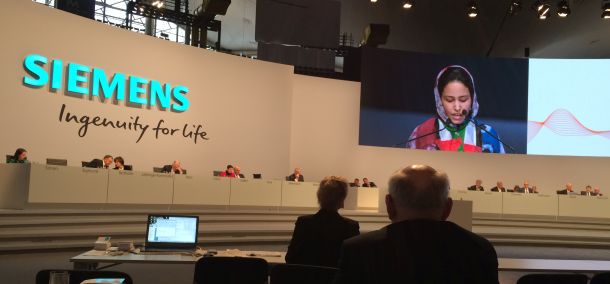
At the company’s Annual General Meeting on 26 February 2024, Siemens Energy’s board could not rule out any further projects in occupied Western Sahara.
PHOTO: Saharawis demonstrating in front of Siemens Energy AGM in 2021.
In spite of years of protest by Saharawis and shareholders, the German company Siemens Energy does not want to rule out further controversial energy projects in the illegally occupied Western Sahara.
Responding to questions presented by Western Sahara Resource Watch (WSRW) in collaboration with the Association of Ethical Shareholders Germany, the company stated at its AGM last week that the company does not consider itself affected by EU-case law on Western Sahara, and that it does not exclude the possibility that it will enter into further deals in the territory.
With a ruling by the highest Court of the EU on the horizon, the company told that Siemens Energy will closely examine the wording of the ruling and the possible consequences for its projects. At the same time, the company explained that Siemens Energy and Siemens Gamesa will fulfil their obligations under “valid contracts in accordance with the law”, without explaining which body of law they are referring to. The board added that the firm will consider each potential new project on a case-by-case basis.
A transcript of the questions by WSRW and Dachverband der Kritischen Aktionärinnen und Aktionäre, as well as of answers from the executive board of Siemens Energy during the 2024 AGM, can be accessed here.
Morocco's development of the renewable energy potential of the territory it holds under illegal, military occupation, is a serious obstacle to the UN peace process. Not only is the North African country becoming increasingly dependent on the occupation for its own energy needs. As projects in the territory tend to be in portfolios owned by Moroccan power elites - including the monarchy - there will be little incentive among these political decision-makers to engage in the UN peace process.
At present, Siemens Energy has only one more project in the pipeline in the last colony in Africa: delivering windmills for the 100 MW Tiskrad wind farm. This will be the fifth wind farm in the occupied territory that will be equipped by a member of the wider Siemens family - mostly in cahoots with Nareva, the renewable energy company owned by the king of Morocco.
The broader Siemens family is connected to four out of the five wind farms that are currently operational in occupied Western Sahara.
“We, Saharawis, strongly criticize Siemens Energy's projects", Emma Lehbib from the Saharawi Diaspora in Germany stated in relation to the AGM.
“To this day, Siemens Energy continues its work knowing that it takes place on occupied and not decolonized territory. In order to respect the Saharawi people's right to self-determination, the company must immediately withdraw from Western Sahara. Any projects should be put on hold until we have decided on our future”, Lehbib told.
In an AGM that was overshadowed by the losses that the firm has incurred in its wind energy business segment, the board of Siemens Energy confirmed that the financial support provided by the German government to address the issue cannot be used “for business in the Moroccan-occupied territories of Western Sahara”.
The company itself states to be aware of human rights related risks in Western Sahara, but will only report on this to the extent required by law.
WSRW also inquired at the AGM about a shipment it had observed in the autumn of 2023, when a vessel departing Cuxhaven, where Siemens manufactures wind mill parts, called into the port of Dakhla, occupied Western Sahara. A letter to Siemens Energy on the matter was not responded to. At the AGM, the company stated that Siemens Gamesa produces nacelles for offshore wind turbines in Cuxhaven and has not shipped any cargo to Dakhla.
Morocco occupied Western Sahara in 1975, in condemnation by the UN General Assembly. Half of the Saharawi people have since been living as refugees, while the territory itself ranks among the lowest in the world in terms of political freedoms.
Since you're here....
WSRW’s work is being read and used more than ever. We work totally independently and to a large extent voluntarily. Our work takes time, dedication and diligence. But we do it because we believe it matters – and we hope you do too. We look for more monthly donors to support our work. If you'd like to contribute to our work – 3€, 5€, 8€ monthly… what you can spare – the future of WSRW would be much more secure. You can set up a monthly donation to WSRW quickly here.
These firms want to supply Morocco with energy from occupied land
GE Vernova, Siemens Energy and Larsen & Toubro are among the multinationals that have reportedly expressed interest to aid Morocco transport energy generated in occupied Western Sahara to Morocco proper.
Dirty green energy on occupied land
How can it be wrong to develop renewable energy, in a world that is in desperate need for a green transition? In Western Sahara, the problems are numerous.
Siemens again refuses to answer questions about Western Sahara at AGM
For the fourth consecutive year, the German engineering company dodges questions at its Annual Shareholders Meeting as to whether it has obtained the consent of the people of Western Sahara to operate on their land.
Siemens fails to respond Western Sahara question at AGM
Why did you not seek permission from my people?, a Saharawi refugee asked at Siemens AGM. Company fails to answer questions why it operates on occupied land.



